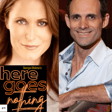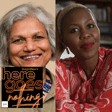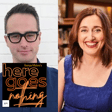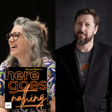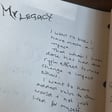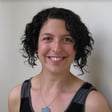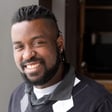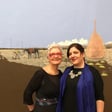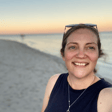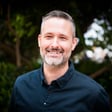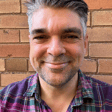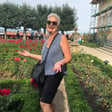Become a Creator today!Start creating today - Share your story with the world!
Start for free
00:00:00
00:00:01

Episode 10: Australia on the world stage with David Ryding
Australia has always punched well above its weight in global artistic affairs, and artistic collaboration is at the heart of that.
David Ryding has had a long career in the arts, as a performer, director, and arts administrator, before beginning a fruitful term as Founding Director of the Melbourne UNESCO City of Literature Office. Georgia and Dave take this opportunity to catch up, many years after they first connected at the University Dramatic Society, to talk about the state of the arts, literature, and how things have changed.
For links to many of the initiatives Georgia and Dave talk about, visit the Substack at heregoesnothingpod.substack.com.
Transcript
Introduction and Episode Overview
00:00:04
Speaker
Welcome to the latest episode of Georgia Malone's Here Goes Nothing. I'm producer Toby Malone.
Interview with David Riding, Director of Melbourne UNESCO City of Literature Office
00:00:10
Speaker
This has been an extraordinary series established by my industrious, brave and indomitable sister, Georgia Malone, who has created the legacy that will resound forever.
00:00:22
Speaker
For today's episode, Georgia chats with David Riding, Director, Arts Administrator and Founding Director of the Melbourne UNESCO City of Literature Office. Dave and Georgia get into an in-depth conversation about literature, funding, the arts and social netball.
00:00:40
Speaker
It's a real treat to get such insight from two of the sharpest minds in the arts. Enjoy the chat.
David Riding's Artistic Journey
00:00:48
Speaker
So this week's guest joins us from all over the other side of the country in Melbourne. Hello, Dave Riding. are you going? Hey George, how are you going? Good, going well. um So before we start, just first off, um what is your earliest experience in the arts?
00:01:04
Speaker
earliest experience of the arts would be going to see Godspell the Musical at His Majesty's or His Majesty's. I get the Majesty's mixed up. He is over here. He is, yeah. It's when they had the King or Queen open it when I was possibly, I reckon, year eight, nine.
00:01:19
Speaker
um And I reckon that's, and it was just mind-blowing, mind-blowing experience of seeing that energy on stage. Yeah. And was that kind of like what got you into wanting to work in the the sector or...?
University of Melbourne and Theatre Involvement
00:01:32
Speaker
No, i didn't work in the sector until I was 30. yeah So I went off and um worked in running camps for children and was a youth worker. yeah And I had a bit of a break from being a youth worker because um one of the parents the kids wanted to kill me and I reckon I don't want to do that anymore. And I had friends from my youth working days who were University of Melbourne and I went the University Dramatic Society, which we both, that's why we know each other. Yes. And I went, oh, this looks fun.
00:02:00
Speaker
And I suggested doing a radio comedy group with my friend who's now the morning editor of The Guardian and and some of his friends who I didn't really know and some other people who had worked with and we made a comedy group.
00:02:13
Speaker
Yeah. And I tried to sell the comedy group to the ABC. Yeah. And they said, no, we don't like it, but we like you. yeah And so they brought my script, my play I'd done for UDS. yeah So University of Matic Society was what got me into thinking theatre was really interesting.
00:02:26
Speaker
Yeah. um And I sold that script to ABC Radio National for the old box seat and i went, I'm never going to have to work again. oh My God. ah It still sticks in my head of how stupid it was.
00:02:37
Speaker
So I was a writer. wrote from 27 30, went overseas ah um screened Wes Grant for play. And I came back and went, yeah, I'm not so interested in writing now and approached Barking Gecko to watch some plays and I got job. And here I am now. You are. Director of City Literature Office.
00:03:00
Speaker
So that time at UDS, it was kind of, with Toby's mentioned it in an earlier podcast episode. um It was quite a special time at UDS. It was quite a few names that have kind of, people who have come out of that cohort It was.
Theatre's Role in Education and Community
00:03:14
Speaker
Toby Schmitz and Tim Minchin, Jen Hegney and things like that.
00:03:18
Speaker
James Evans, Associate Director Shakespeare, who I talked to two days ago. and it's just interesting. It's interesting because university is such a hotbed and that there was so much brilliant creativity and brilliant people and people who have nothing to do with the arts now, like someone like Ben Roos, who...
00:03:36
Speaker
But you still, and I think you and I have this, you still have a shorthanded connection. Yeah. It's the one thing i think, because we all went at all different places, but we missed, we don't have, we've never used that shorthand again creatively.
00:03:48
Speaker
And it's really interesting. Even with Toby, it's just like we had something there, we had that little, we had that moment and we had a shared understanding. And I reflected on it because i was talking to James about something I'm doing now. And when it hasn't changed, we still got that.
00:04:01
Speaker
Yeah. paint In our head, painting our stage before going and writing and chalk our names afterwards. Yes, I think my name is on the walls. Yeah, mine is. Dolphin Theatre way too many times. Yeah. It happens when you're a stage manager sitting backstage yeah and with a Sharpie.
00:04:16
Speaker
Yeah. What was the show? What's the first show we did together? up I'm not sure. um We did a show. Oh, Proteus. Were you involved in Proteus Unleashed? No.
00:04:27
Speaker
It was chaotic. I wonder, was it Toby Schmitz's play Starcrossed? No, I didn't do that one. I think it was justin Justin's play. Yeah, I didn't do anything with Justin. um did see him recently standing the park doing a phone call.
00:04:42
Speaker
yeah but Yeah. Yeah, yeah. He's a serious lawyer now, is he? A serious lawyer. Yes. Yeah, it was just it's such a special time. I just remember going, Toby taking me along to a party, UDS party, when I was like 16 and I was like, what is this?
00:04:56
Speaker
Yeah. This is amazing. Yeah, yeah. and well It was really good and I think it's easy to get blinded by and everyone says, oh, you mention. Yeah. um But there's just so many good creators coming out of that and it showed the benefit of ah what was a recreational theatre program, the excellence of some of those plays and some the things. Like I think of someone like Andrew Lippiot, who I think is just an amazing director who didn't go on to that career, but an amazing director, an amazing understanding of the language of theatre.
00:05:27
Speaker
um And not all of us went on to be professional, but so many people went on from that role. Yeah, I think that there seemed to be a lot more new work around at that time, like yeah like the the people were writing new work.
00:05:40
Speaker
um And it then it kind of me shifted into more just existing text-based work. Yeah. It wasn't those risks that we used to take. Yeah. I just also remember when I came back to Perth ah years ago and there was the exhibition for the 40 years of UDS and they had all the posters, which were great.
00:05:57
Speaker
Yeah. But they also, it is still this is hilarious, they had a podium for the Dollies at this award system, which was the biggest tongue-in-cheek ridiculous thing ever. And I was like, really, you're highlighting that?
00:06:08
Speaker
Yeah. They're still going. They still do the dollies. Oh, golly. I never got one. was so upset. I got one, but that was a sympathy one because I should have won their stage manager.
00:06:19
Speaker
i got one for Proteus Unleashed, the show that was at the Rackabites, which was chaos and everything, but it was great. But, yeah, I think it was, you know, we know you worked really hard and it was a really tough thing and you should have won their stage manager, but it was a popular vote. And the guy who stage managed the show,
00:06:38
Speaker
with 30 people in it, one. Yeah. So it's spray painted Barbie. Yes. Yes. I spray painted, yeah, we did it one. We did the spray painting one year Cleona's house. Remember like making the actual dollies, which are Barbie dolls stuck into a piece of wood, spray painted gold or silver.
00:06:56
Speaker
Magnificent, magnificent work. It was an amazing time. it was kind of really um possibly contributed to why I failed my actual uni course quite dismally because I was too busy having fun doing shows with UDS and doing shows at the Blue Room and things like that.
00:07:15
Speaker
So, yeah. It does really highlight and it's something I think about a lot in my career about community and and community and culture and community and creativity and having that shared language. And I look at Perth and that, you know, i look at like um the big hoo-ha crew who've been to together a long time and that shared understanding of the way they work.
00:07:38
Speaker
It's really powerful. And I think it's one thing because we have so many West Australians who have to leave because the industry is so small and the opportunity is so small. oh um We have so many Perth people in Melbourne you know, we name dropping people across the East Coast, but you lose you lose that shared understanding. Yeah.
00:07:55
Speaker
And I don't know, you know, I think of someone like Mike Frenchman is over here and is now a high school teacher, incredible actor. And I really like when I started working professionally, i worked with him a lot.
00:08:06
Speaker
But you don't, I don't feel like the payoff now to still have that understanding. yeah doesn't Yeah, it doesn't seem seem to have lost. um Maybe it's just because we're old and not really paying attention. I think it's one of the challenges of Perth. I think Perth's really good for having those communities who work together. I've got to misthink of the group who have come on since me.
00:08:31
Speaker
Anyway, so I think it's really interesting. It's one of the regrets of someone who's an expat. I know I wouldn't talk expats, but I go. Yeah. It would interesting if I still working in the area. Yeah. Like I worked with Steve Hearn, who was my musician i'm from Barking Gecko days to my independent career, and I worked with him last year for something at the City Literature Office, and it was just easy.
00:08:49
Speaker
Yeah. And it was just joyful. Yeah. I found work everywhere working. Perth people are, yeah, as say everywhere. And when I went to Sydney, first time, realisation that nearly every arts organisation had someone from Perth that we'd connected with at that time, and it was, yeah,
00:09:06
Speaker
It's really, yeah, it's good. it kind of, it becomes that kind of grounding, comforting thing in a big city, in a big new place that you actually do know other people and you belong there. So, yeah. Yeah, I think so.
00:09:19
Speaker
So you worked with Barking Gecko um for a few years?
Children's Theatre and Community Projects
00:09:23
Speaker
For a few years. They famously accepted me to volunteer, no other theatre company.
00:09:29
Speaker
I picked them because I thought I had the most chance to work internationally. I've never told Graeme Gavin that. And then my first staff meeting, I sat in, they said, we're not working internationally anymore. I'm like, oh, well, I'm here.
00:09:40
Speaker
But I was really interested in children because I you know i had ah half a primary school teaching degree. i was interested in their work. I really... liked the concept graham had doing plays about small stature so kids could find themselves in it you know and ran about mice achieving musical um and it was just and he you know i didn't study didn't study i didn't study directing uh have no qualifications in the arts i've got a bachelor of applied science in recreation that one
00:10:12
Speaker
um But they gave me an opportunity across three productions across one year, which was lucky could work part-time and, you know, I had the possibility to be able to pay myself to do it.
00:10:24
Speaker
I made myself a role. And so they offered me the role of being sort of participation officer, I think, in the original role. And it was straight up I got rejected for NIDA the second time.
00:10:34
Speaker
Yeah, right. I'm never going to make it. And Graham said, do you need to? And went. Fair call. And I was there for two, three years and eventually my role became associate director. wrote plays, I directed plays.
00:10:46
Speaker
I've worked in rehearsals. It was one of my most pleasurable jobs working at the time, you know, worked with, Aaron Beach is now the general manager of Belvoir.
00:10:57
Speaker
Just incredible people, incredible time, incredible energy. And I really like working with Graham. Yeah. And yeah, it was good. So I really look back at it fondly. I look back at the staff. I look back at the plays. I look back at the experience. I travelled WA. I did a two-year community cultural development project in Leonora.
00:11:15
Speaker
worked in Broome, I worked with some amazing artists an amazing musician and and it's really vital time at the company I thought. And what ah do you think, is Barker Gecko's a theatre company for young people, the importance of theatre and theatre making for young people?
00:11:34
Speaker
Oh look I think it's essential, it's if theatre, I think the arts as a whole exists in a bubble. Theatre can exist in a bubble where at its worst it's just playing to people who are in the industry.
00:11:47
Speaker
And I think when it can break out in the industry and change the language and people see theatre, and and that's why it's really important. but So, you know, it's in the UN rights of the child, creative and to be an owner of their own work and see it. So I think it's really, really important. And Gecko at that time had a thing going on with the fact they were going to schools.
00:12:08
Speaker
The world's changed. yeah now but I think it's really important yeah those audiences because theatre you know as all the performing arts could actually end up as a folly for the boomers so it could be going yeah it's interesting now the new um Barking Gecko where it's at now in the merger with the Awesome Arts Festival <unk> been exciting and sam's there I think I think it's really exciting to see someone like Sam Longley who's just an incredible artist and a real creative force get that role at where he is in his career.
00:12:41
Speaker
It's always the arts industry wants the new and the shiny. And I go that and go, Sam is not the new and shiny, but he's great source. He's one of the most naturally creative, curious, inquisitive people. And he's one of those people look at and go, it would have been great to be in Perth and work with you still.
00:12:58
Speaker
Yeah. Yeah. No, I'm looking forward to it. Yeah. yeah Yeah, absolutely. and And looking forward to where they take it and, you know, taking, um, their work to the regions and other metro areas and expanding that, creating access and opportunity for young people that might not get it otherwise. think it's really important. Sam makes work that's fun.
00:13:17
Speaker
Yeah. think that's really important because I think it's easy to make work for children that's worthy. But I don't always think it's appropriate. I think of Damon Lockwood.
00:13:29
Speaker
Yeah. He's now over in Wellington, Auckland. um He said to me once, he said, it's okay to laugh. And I kind of think that. I think that's something that's forgotten. And I think it's easy for children to be the big themes.
00:13:42
Speaker
Yeah. I know Gecko strayed into that at times, even when I was there. But it's okay just to have fun. And Sam gets that. Yeah. um Mentioning Damon Lockwood, so that was the one ah show that we did work on together was Domestic Bliss.
Collaboration on 'Domestic Bliss' and Theatre Opportunities
00:13:57
Speaker
It was. The first thing we worked on was something before that. Surely. We've done lots of stuff. I feel like we feel like we've worked together lots, but maybe we haven't. Maybe we're just in the same room. Been adjacent. No, no, we've definitely done some stuff. Yeah.
00:14:07
Speaker
And that yeah that show was at the Blue Room um in the mid-2000s, around about, or early. Good dates. Well done. sometime around then. And that was kind of, that was a really, think, special. It was one-man show and you you as director and um can't remember, what was that publicist or something?
00:14:25
Speaker
Marketing? think were everything. Everything. You, Damon and Brian Keyes. Keyes. He was now very high up in events management in Australia. And I still see, I go to the football with him to see the yeah Mighty Fremantle Dockers.
00:14:37
Speaker
Yes. And so, well, not so mighty after last week. No, it's only the first game. It's only the first game. Yeah, look, how good's the Blue Room? There's nothing like it in Australia um for giving you that spot, giving you that opportunity, giving you that money and giving you audience because it was probably the first audience who come who don't know you.
00:15:00
Speaker
Yeah. And we did Domestic Bliss Australia. Melbourne Fringe, didn't quite work, had a good time. Yeah. It won a playwriting award and was on at La Mama, ah not La Mama, Tamarama Rock Surfers, Old Fitz, and it just wasn't working. That moment, you know, such a silly play.
00:15:21
Speaker
So silly. we spent We made a washing machine have a phone come out of it and spent a lot of time organising that. and it Yeah. It was good. I remember taking it, we went on tour to Manjimup with it.
00:15:34
Speaker
Did we? For a one-off show, yes. Myself, Damon and Talay went down and did a one-show in the back of the Manjimup pub. Right, right. Stayed in the accommodation in the hotel, which were obviously for, you know, temporary.
00:15:48
Speaker
combination for workers and things was an experience. I saw Damon a couple of weeks ago he was passing through after being in Perth and I was trying to get him to do a remount of it. It was so much fun even just the writing of the process. I remember writing it down at Murdoch in the rehearsal room and I didn't really know Damon.
00:16:07
Speaker
yeah through He auditioned for Gecko and then we did but we Murder Me Dead, which was the four-part, 30-minute, very bad comedy thing. And we were remembering that with ah Paul Goddard was there as well.
00:16:21
Speaker
um Yeah, it's such a talent. It's such an incredible talent, Damon, I think. It's just really, I know he had his time with Black Swan, but I just go, there's not many writers for writing that level comedy in Australia.
00:16:33
Speaker
yeah It's a shame he couldn't have been doing more. Yeah, and I feel like i've um with the Blue Room, and when we were around when we were there at the Blue Room, sort the early 2000s time, there was such an opportunity to take such risk.
00:16:49
Speaker
yeah you know it was There was nothing but risk involved in a lot of it. And it wasn' wasn't about whether things were good or not and people took took punts on random random shows and things like that. And a lot of the time they were quite terrible and a lot of the time were You find these magic moments of these. It's incredible stuff, incredible stuff. And I got to do, it you know, I did three short plays from an Argentinian playwright from the days that it disappeared. You wouldn't get to do that anywhere else. and that was instructful for me and my aesthetic for what I was director and the way I worked that and also 15 Minutes of Fame.
00:17:26
Speaker
We commissioned seven playwrights to write their own thing and we did that here. at the Croft Institute and it went really well.
Melbourne as UNESCO City of Literature
00:17:33
Speaker
So you can't you can't get that opportunity for that. I got my work at WAPA and Perth Theatre Company. so Yeah.
00:17:40
Speaker
And and i wouldn't have got my, know, when I became Art District Director at Main Street, I wouldn't have got that if I hadn't had that time at the Blue Room. Yeah. So you left Perth in quite a while ago now.
00:17:53
Speaker
It's it been a while, yes. It's been for nearly 20 years. 20 years, yeah, right. twenty years yeah say that. It's funny because I'm only 30. So I left when How does that happen? It's a miracle. It's only because i know I've been in this role for 10 years, which is unheard of.
00:18:06
Speaker
And then was in Sydney when we were both in Sydney. Yes. um And then I reckon it was a few years before then. someone Yeah. And so because you worked in in Sydney, you were working at Australia Council?
00:18:19
Speaker
Yeah. I was at New South Wales Writers Centre first and Australia Council. So I went Perth, Melbourne, Melbourne, Mount Gambier, Mount Gambier, Melbourne, Melbourne, Sydney, Sydney, Melbourne.
00:18:29
Speaker
Yeah. That's it. Yeah. Unless I run out of work and have to go to another state. Run you out of town. Yeah, yeah, yeah. So, um, For past years, you've been working at Melbourne's UNESCO City of Literature. Can you talk about what that means?
00:18:45
Speaker
Yeah, so where Melbourne's UNESCO City of Literature. I have been for 17 years and it's part of a worldwide network of cities who are creative at a local level. So it's who are using creativity to try to sustain all development.
00:18:58
Speaker
That was its starting point. We're the second city of literature in the world. um As part of being a city of literature, you have to have a focal point who deals with all the UNESCO things. ah So because there's some reporting and there's some contact as well as activates a network as well as do does the goals of what a city of literature does in Melbourne.
00:19:15
Speaker
So originally when Melbourne became the one of the clevest pieces of arts bureaucracy ever, they said to UNESCO, if you let us in, we'll build this big centre of book writing which is the Willis Centre.
00:19:27
Speaker
And at the same time, they said to the government, they won't let us in unless we build this. There's a very clever public servant somewhere in that. bought it But then I realized because once I got the the wheeler center bequest, it was this programming and it wasn't activating the network. So they needed a focal point. So 10 years ago, after spending way too much money on consultants, they decided they needed an office and it's going to do a weekly newsletter and have a help desk.
00:19:51
Speaker
And I was moving back from Melbourne because back from Sydney because my daughter was born. and grandparents and I applied for the job and taught them out of it. yeah and You don't need that. This is what you need.
Literacy Challenges and Global Connections
00:20:02
Speaker
yeah You need to have someone who connects Melbourne, supports activity and reflects us to the world. And so now it's kind of after 10 years, it's really the designation is all of Melbourne, which I still think I've got down.
00:20:13
Speaker
And my work is the bridge between us and the network. So yeah, Give you an example of today's work. I was talking to Partners in Leon. Their biennale is being programmed by an Australian. I said, this is this an opportunity to do something from a reflective point of view?
00:20:27
Speaker
We're doing a big program of First Nation Writers in partnership with Black and Bright Festival here, which is the First Nations Writers Festival. First Nation Writers in Dunedin, Seattle, Quebec City, possibly Rio. We're not sure if they're coming through, but Taipei, which is really exciting. Taipei is not a city of literature, but we have contacts with them.
00:20:44
Speaker
So I'm organising that. So it's a bit of that stuff. Don't do any public programming a traditional sense. I do a lot of connection and a lot of, you know, one of the booksellers here said I'm the ambassador for Melbourne. Yeah. it's It's certainly never been dull. like i got my cheap I got my goal of working overseas.
00:20:59
Speaker
Yeah. And because you're overseas quite a lot, it seems, so and those kind of connection moments. Yeah, I think it's there's a really good quote, and I'm trying to remember who quotes. Someone quoted this to me last year, that partnerships move on the speed of trust.
00:21:16
Speaker
Mm-hmm. And one of the things is in the arts industry, we move jobs a lot. But overseas, they don't. So I'm dealing with people I've known for 10 years across it. Because when I joined, there were seven cities. And then three weeks in my first job, it's three weeks after getting the contract, I was in China, which was, as you imagine, a bit of a culture shock. yeah Six other cities.
00:21:35
Speaker
um so i have two trips i meant to do a year i meant to go to the unesco general summit which is all the creative cities there's eight designations of 350 cities um and that's kind of their unesco's big kpi and i have a cities of literature cluster meeting which is more about cities of literature um we're a bit of seen as a senior city i was the chair of the network for a while as well so i've done that but it's a lot of just building trust, and I think we've seen benefits from Melbourne Riders, which is what I do.
00:22:06
Speaker
ah do and um it ah It certainly, i didn't think when I emailed Graeme Gavin to come, I don't even think I emailed him. I don't think would think it was emails and I think I might write a letter.
00:22:18
Speaker
Yes. Amazing. But I'd be going to these places and having connections around the world. And, you know, we're doing a program with Bendigo Writers Festival, which is involving seven other cities. So the fact that I'm sending an email to a friend in Heidelberg,
00:22:33
Speaker
It just dust my head in Yeah, it's amazing. Speaking of writing letters when i was in and i was at university, in 1999, I wrote letters to every production company in the phone book, got the phone book out, wrote them a letter saying, hi, I'm Georgia.
00:22:49
Speaker
have a job? Posted them through the mail. Yeah. And I got a job. So it works. this sounds worth you can fight It work. You're going fortune favours. What is it? The meek bud in her at the earth, but they're it last.
00:23:02
Speaker
Yeah. Yeah. um So Hobart is a no that so that's and's the second Australian city. Has that come on recently?
00:23:13
Speaker
Hobart came, they do new designations every two years. So they came two years ago. They're in an interesting place. you know, the the way I describe it to people for cities of literature is a city of literature office, you're trying to solve one core problem in your city.
00:23:28
Speaker
My core problem is distance the rest of the world, both in our perception. Melbourne, like i I work in the Wheeler Centre, We work with the national body of poetry we share in office. We we have Express Media, which is the only place that publishes under 26 writers and plays them in the world. have the Emerging Writers Festival, the only festival for Emerging Writers Festival in the world.
00:23:47
Speaker
We have one of the few First Nation Writers Festivals in the world. We're in the Wheeler Center, which is fairly unique. people and And that's just a quick list. I'm not, you know, Miss Writers Victoria is one of the few places that has a Writers with Disability program.
00:24:01
Speaker
People in Australia like that don't get it. They don't get i don't get how good they are. You know, so the reaction of being a UNESCO network, they're like, oh, are we really? Do we get money and will we lose it?
00:24:11
Speaker
yeah We're really good. So our perception of this, we are a long our way away. And for artists in Australia, to make a career, travelling is pretty essential. And for for authors where, you know, we're such a small market, there's only 27 million in Australia, they need to be published overseas, but the distance is huge.
00:24:30
Speaker
Also, people's perception of Australia is wrong. Because if they're, if, you know, Bluey has probably been more instructive to people's perception of Australia than anything, because if everyone's just reading Australian books about the loner going to a country town to solve a mystery, we're a city of cosmopolitan, we're a country of cosmopolitan cities.
00:24:51
Speaker
you know, we're multicultural. It's just... So that's my role. So Hobart's key challenge and why they apply it this is literacy. They have a 54% functional literacy rate. So people can read, but they can't read at any depth.
00:25:03
Speaker
So they went, we can use this network to help that literacy. And this is the same thing as Nottingham. Nottingham, when they applied, it was a literacy thing. You know, if your network, if your organisation running it, being it based in the libraries, based in the council, based as an NGO,
00:25:22
Speaker
knows what the challenge is and i can go through probably all 53 who are active there's some we never hear from we go this is what our ira city is absolutely dominat dominated by the university of iowa and caitlin clark now yeah um but their key challenge is there's not enough programming so they do the programming they do the jazz festival Yeah, right. so So you have to kind of watch your challenge.
00:25:48
Speaker
and and And that's what Hobart's doing. And we've got a very good relationship with them. um They're still trying to work out their structure because you can do something wrong. you can If you give out a grant the first time as your first program, you're going to be expected to do it.
00:26:01
Speaker
So I'm always saying take time, work out what you're doing, articulate it because a creative city office is nothing like any programming thing Australia because people in arts organisations either program or give money.
00:26:14
Speaker
I do neither.
Critical Discourse and Arts Sector Challenges
00:26:15
Speaker
yeah So it's kind of, it's taken taken a while to get them to understand. Yeah. So is it about connecting with those other cities and around the world? Yeah, connecting building trust.
00:26:26
Speaker
Yeah. Yeah, we we we we track... Every writer who goes overseas, so it say say Nottingham comes and say we're celebrating the hundred year of Byron's poem. And so we commission a writer to write something which appears over there. So they get yeah money, they get a credit, and that someone rents an Australian art.
00:26:43
Speaker
So last year we had 35 of those commissions. Yeah, right. For an office which is funded not a great deal. Plus, we also have writers come in. we We do a lot of work in the virtual space. That's the thing with COVID. We love it.
00:26:57
Speaker
So at the moment, we have a virtual writers room from write from comic artists from Exeter, Quebec City, Reykjavik, Iowa City, Melbourne, and... Ooh, somewhere else.
00:27:08
Speaker
So they're meeting once a week and what they've done is they've each drawn a new comic with words but they've but they've distributed to each other the the version without words and then they're doing their own script and then they're sharing.
00:27:20
Speaker
No one's going to see those comics. There's nothing at the end of it but it's like a little writer's residency. Yeah, yeah. And they love it. So we do those. We've done Greenhouse, which is Nature Writers, one twice in partnership Heidelberg.
00:27:31
Speaker
And we also host Virtual Writers in Residence, which we're coming up to our fifth year of that in November. So what role do you see literature and writing and they and other kind of those forms, that area and reading play in the role within community?
00:27:46
Speaker
It's really interesting, isn't it? it's um ah so It's just reflecting on... what a critical place we are in the world at the moment. It's a casual thought i was having.
00:27:57
Speaker
But, you know, that we're losing the ability for discourse. Any conversation is yes, no, and that's led by our politicians. You know, i remember complaining to my mum back when I was in my early 20s about why does the opposition just complain all the time.
00:28:11
Speaker
It's also so bad. there's no We don't have a room for a good idea. There's no way. Let's talk about the fact that, um say, negative gearing. It is the worst thing in the world, negative gearing, but it's never going to change.
00:28:24
Speaker
People argue it. It's like when Bill Shorten was going for the election and he said something about renewables and cars and Macaulay Cash Account said, Bill Shorten's cancelling the weekend. Anyway, so we lost critical discourse.
00:28:36
Speaker
Yeah. Underneath that, the humanities is just going because of funding, you know, the the last Liberal government, what they did the humanities. um we lose the humanities, we lose critical discourse, we lose curiosity, we're going to lose creativity, we're going to lose community, and we're going to lose the arts.
00:28:56
Speaker
Somewhere along the line, The ability to read is instrumental in thinking and I think really important. It's a challenge. it's It's one of the few art forms you need a skill.
00:29:08
Speaker
You need to be able to read to do it. yeah It's one of the few art forms that we can't all do across the world. Language is a big problem for the Cities of Literary Network. It's our greatest strength and it's our greatest weakness. But it's really important it's and it's it's such an interesting...
00:29:23
Speaker
interesting art form because i don't feel I'm a literature person. Same as I feel I'm a theatre person. I'm interested in how community works but thinking there's no other art form that you create as an audience.
00:29:35
Speaker
Yeah. You see a theatre and you see the one place. You see the one time it's on and it's amazing. You're in that moment and I'm really fascinated moments but you read a book You're reading your book. Yeah. So I'm sure we've read the same book occasionally we've had completely different experiences because we're creative. And I think the thing, and at University of Nottingham's done a research on this recently, I think the fact that books, reading a book is ah inherently creative is really interesting.
00:29:58
Speaker
Mm-hmm. Don't go right off course on that answer. No, that's fine. um And so, they're you know, talking about the discourse and how it becomes so reactive and, you know, about sound bites and headlines and things like that, the recent controversy at Creative Australia, just the um fact to that, you know, it seemed that there was a knee-jerk reaction to something, ah Murdoch paper and a potential arts minister
00:30:30
Speaker
said and kind of responding because they didn't want to create? ah don't know. yeah I don't know if it was that. I don't know if we're not getting the whole story. Yeah. so you see I just want to say that because I've worked at Australia Council and I know the rigour the briefings I used to run Art Start, which was the much beloved program that should come back where ah university graduates got $10,000 for professional development to use three years after their course.
00:30:57
Speaker
Great program. But I was the right brief. We had one artist who, a visual artist whose art form involved them producing their art. How can I politely put it out of their bottom? So I had to write a lot of briefings about that.
00:31:09
Speaker
So I have no doubt that that process had a lot of briefings. And if the briefings were bad, that's one thing. But I don't think, I can't think Creative Australia would do such a ridiculous shooting in the foot because of one shadow i minister.
00:31:25
Speaker
And it's great, the Liberals have got a shadow minister. Let's celebrate that because they didn't have ministry. yeah um I think there's something else. Yeah. don't know what it is and to do so bad and to lose your prime sponsor I don't know That's a aside.
00:31:40
Speaker
I don't know. It's completely wrong. And I think this is the thing I recently had a conversation with the excellent journal, ah Kill Your Darlings, and they kind of went up there. And we have a big pressing problem in Melbourne with conversation about the Gaza conflict.
00:31:56
Speaker
um And, you know, people can Google State Library, Google Melbourne Symphony Orchestra. It's a huge issue. The level of... interest in arts organisations for dangerous conversations is nowhere near the need for artists to talk about it and that's a really bad problem.
00:32:13
Speaker
no Yeah, it's so complicated. <unk> But we we we we are funded very conservatively. Yeah. Very conservative and but we, you know, Melbourne is the most feisty left-wing city in Australia. There's no doubt about it.
00:32:33
Speaker
So they're up for a fight. um But we're not getting people with loss, the ability to express. And it's, you know, ah the start of the conflict, there was a,
00:32:43
Speaker
ah huge lobbying campaign against any arts organisation which was talking about it and it got really dangerous and people had to leave their jobs to stress because of the level of you know antagonistic communication but how can you not reflect the world as an artist Yeah, it's your role, right?
00:33:06
Speaker
it's It's your role and that's what we need. Yeah. we can't It's not just entertainment and this is one of the things that's coming out. It should be entertainment. Yeah, it is entertainment. It can be but it's like when the rise cancer and COVID and they funded it at a Lego exhibition in Melbourne as ah as an arts thing. Okay, that's cool.
00:33:21
Speaker
That's great. But. But, yes. that was ah That was a time. so speaking of COVID, and here in Western Australia, didn't i mean it it had did have impacts, but it was nowhere near what it was like over there
COVID-19's Impact on Melbourne's Arts Sector
00:33:36
Speaker
in Melbourne. I had it easy. My web developer, at the start of the first lockdown, just drove across Nullarbor.
00:33:42
Speaker
Yeah, right. but like i'd be Because we had a we had a company that went bankrupt. We made our website. And so we developed it. It's really good. yeah And Miss working her. But she was, you know, I'd be sending her things. I'm just going for a swim. I'm like, yeah, good.
00:33:56
Speaker
I've got my 30 minutes a mandatory walk. oh I remember coming to Melbourne after COVID and people were like, oh, you're from Perth. Oh, you guys had it really tough. I'm like, no, no, we were fine. You just couldn't come.
00:34:09
Speaker
It was just because you weren't able to come, but we were fine. ah think it's I think it was at the time the best of Melbourne. Like I think we did really well at it and it was all that moment.
00:34:23
Speaker
just before you went and locked down when you didn't know you felt bad but once it happened people just did it and people would send people things people we were all in it together and it was great but i just i think the long the long covert effect on melbourne i know like the art sector people book differently there's a different sort of thing people are now wanting to connect and get back together um And we don't still have that gut feeling of, oh, they've got COVID. But I think you like I was commenting before to you when was there about it changed Melbourne's driving habits because people used to know cars on the road.
00:35:04
Speaker
ah and And we, and and and the same sign as the Liberal government putting in the GST, um if you have your own business, you get this big money back on a trade car.
00:35:15
Speaker
So everyone's buying those ridiculously big, you know, wank panzers. Yeah. And they mean that streets are more congested. So people, like, under Melbourne lights, everyone's going to go through a red light.
00:35:28
Speaker
because And we've, we but kind of, we lost what we had. Yeah, yeah. and do you think it's fundamentally changed the arts sector there? Yeah. oh Look, our government's gone from being quite well off to not.
00:35:42
Speaker
one of the states that can't generate its own wealth. We've got a huge... And Premier Dan Andrews, who's much maligned, got us through it because he just spent a lot of money on infrastructure.
00:35:53
Speaker
Yeah. quite well. um But the arts industry's not in a great place. We're bit worried about Creative Australia. yeah Mm-hmm. How that's going to do. Audiences have changed. I'm really interested how the major performing arts organisations are going.
00:36:08
Speaker
Mm-hmm. There was a lot of panic. They were seeing their audience stopping. And also a lot of their core audience, their subscriber audience, is not coming anymore. m So we're we're changing. A lot of people leaving the arts and a lot of people are looking at it and going, why would I enter that?
00:36:23
Speaker
So it's it's tricky. I've often asked myself that same question. Yeah. I'll tell you that, people still go to musicals and people who are funded by Creative Australia don't see musicals as part of it.
00:36:33
Speaker
So they're still going to musicals, they're still seeing it. People in Melbourne still, I think a think about Melbourne, which I've always thought, is people in Melbourne go out to things. The way they go to the football, way they go to the Grand Prix, the way they go to the Myer Music Bowl, it's all the same Melbourne and I think people need to see it.
00:36:52
Speaker
Yeah. Do you think the new precinct, the Arts Centre precinct that they're building is going to change things or make it better or is just more...
Development of Melbourne's Arts Centre Precinct
00:37:01
Speaker
don't know. it's It's great to have a modern art gallery. Yeah. And it's really exciting that Fed Square is now part of it because I think Fed Square is really interesting.
00:37:10
Speaker
in that anyone born in melbourne hates yeah like it they say it's ugly anyone outside of melbourne go this is amazing and you know from sydney one of the problems with sydney it has no city center yeah it doesn't have a place and you might done the same thing as me when we moved we went to the city in the first weekend and it was just like this is us and zombies it's like what are we doing here but so fed square can be the city centre square.
00:37:36
Speaker
And during the Commonwealth Games when I first moved down to date when I was here, it was amazing. And also like when, you know, there's moments there like the Matildas would be the next time where a whole lot of people went down to watch Matildas live on that.
00:37:51
Speaker
So it's really important. And that, its fault was it was using arts and culture to help the tenants. yeah So be a deluxe to have more people. So that like when I went to Melbourne Riders Festival a lifetime ago, um we were running the festival.
00:38:10
Speaker
There was a Dolly Parton karaoke group and there was Guide Dogs for the Blind all competing the same area. So it was just noise. It was cultural noise. But now that ah Katrina's there, who's quite programmer ah great great leader, it's now seen as cultural programming. Yeah.
00:38:29
Speaker
purpose And i think that's really exciting. I saw that they had on the weekend, was it at the weekend, the kneecap um free performance, the Irish rap trio.
00:38:39
Speaker
um Yeah, and the crowd. It's just amazing. Yeah, I'll add Robbie Williams. Thank us for making his monkey movie. He did a free concert there. it's it's It's a really vibrant place and i think I think public squares are important and the Australians do a good job of it.
00:38:54
Speaker
I don't think like... I don't think that Perth's got it. I can't really think of any city that has a good one, but Fed Square can be that. And I think the art sector and I don't think people in Melbourne rate the Yarra.
00:39:05
Speaker
It is gorgeous. And even going right down to um the casino, there is a city centre hub. and And, you know, when I go to something at night, Melbourne's a alive.
00:39:17
Speaker
And one of the things is it's alive because of international students. And I don't think we knew how important they were for the cultural identity in Melbourne until COVID. Yeah. Yeah, interesting.
00:39:28
Speaker
And so you sat on you sat on boards, you are on
Arts Governance and Funding Challenges
00:39:31
Speaker
boards. Why do you feel it's important to kind of play that governance role in arts organisations? Yeah, I'm only on one now. I'm on an advisory group and I haven't been for a long time and so I had been before.
00:39:44
Speaker
Like I think I was on one board for a day. um It's just because I couldn't do the Australia Council. And I have a vested interest in literature. so I was on Black and Bright for a little while and it's to help set up. But it's just a conflict.
00:39:56
Speaker
um yeah But I'm on Polyglot. They're an amazing company. Amazing company. Obviously, it's interesting because it's for children in the world and it's high-functioning board. But I think it's as much for me as for them.
00:40:10
Speaker
Yeah. I'm really interested in it And I think... I think arts boards are not good generally. And I'm sure you've been across what Kate Larson's been writing about yeah boards where people aren't. I think they're functionally inept.
00:40:24
Speaker
And I've worked with some really bad ones. And one that sticks out and and I always go is when I was at Emerging Writers Festival 15 years ago, That board was high functioning and their chair, that chair we worked with, set them up to where they are now.
00:40:40
Speaker
And whenever it was a success, I go, it was back then. So, you know, that's what a board can do. But at the most, they're kind of, you know, not know their roles, committed generalists or people who are interested.
00:40:57
Speaker
I find sometimes really frustrating the the lack of engagement in the work that you do. So, you know, was involved with a company that struggled financially and had to close, but the board was kind of, there was a lot of people on that board that had never been to shows before, before they they kind of joined that and kind of like didn't get it and didn't.
00:41:19
Speaker
And then when it came to the crunch, what was their role to support this company to make sure that it survived? It was sort of like the level of, I'm not saying they didn't care, um but it was just the level of engagement and actual help to be able to fix the problems was small.
00:41:38
Speaker
Yeah. I think we found ours wanting when the George Brandis attacks happened. Yeah. And boards were just saying, it's okay, you'll get the money somewhere else. Yeah. And we've got a lot of people, we've had, you know, a roll call of very good arts workers work through this building in my time here.
00:41:54
Speaker
who take it really seriously and really believe in the arts. And I think it's, you know, you kind of have to, but having that sort of dismissiveness of it is kind of like, no, this is big deal. It's a big deal. It's a fundamental change. And i and it took Creative Australia until a couple of years ago to come back from that.
00:42:12
Speaker
And that, you know, arguably destroying the peer-based system, it's possibly a mistake. Yeah. i It's unarguable. It is. Yeah, yeah.
00:42:23
Speaker
But i just don't think I don't think the structure is right. But I also ah sometimes friends wonder the whole world of not-for-profit is wrong, but not for financial profit.
00:42:36
Speaker
Yeah. So that we, because we're not getting the dialogue of what do we give? What do we give to the cultural health? I did i won a program called Visiting Literary Programmers where we fly in people from around the world. It's one time we fly people in. And it's really impactful. So we get festivals. we had an Indian festival from Kolkata.
00:42:54
Speaker
And it was such a defining moment for me about five, six years ago. As you said, my role is for the cultural health of my city. And I view that for the lens. We've got the Melbourne Writers Festival launching tonight. Victorian Premier's Literary Award last night.
00:43:08
Speaker
what are they doing for the cultural health is important because if not, it's just content. And I think arts fails when it's content. Yeah. Yeah. I mean, so it's so important in the work that I do. It's sort of about supporting arts organisations to able to make stronger contributions to the cultural landscape. We're not there to decide what we like as what art we like. It's sort of we trust those organisations to make those decisions because they play such an important role in the vitality and the the connectedness of the arts sector in its role within the community because it's so much bigger than that.
00:43:43
Speaker
Yeah. Yeah, absolutely. Absolutely. i think I think we're very lucky in Australia. We're very well-resourced. We've got a lot of – and I don't think we realise that because it's always – it's one of the with international like, oh, it's on that, you know, there's a living wage in Ireland.
00:43:57
Speaker
Yeah. Oh, the Germany, they've got the money. French, they can send money at everything. They can – but they have got is distance. i can go and see each other and and they're in Europe. But we' we've got a very good arts funding thing.
00:44:09
Speaker
you I don't know what Perth's like now with local government, but we have City of Melbourne funds, City of Merabek funds, City of Darabin funds. So we've got local, that's a city of Yarra. So there's four that's pretty much the art scene is getting funded at a local level before they get funded by Creative Victoria who fund some remarkable things that no one else would And then you've got Creative Australia. And then we've got, so we're, and, you know, I was sitting in a building with six literary organisations on a peppercorn rant.
00:44:39
Speaker
Yeah. um We're so lucky. And then, like, I talked to my friends in Germany during COVID and said we were just trying to find money to stop artists starving. it I think sometimes we forget how lucky we are. The main, and again, the problem is distance.
00:44:53
Speaker
We can't jump on a train and go to a period of writers' festival in an hour. You know, we jump on a train for an hour in Geelong. Yeah. But I'm just saying it's it's not like appearing at Frankfurt. You know, for a publisher, going to a book fair is a major amount of money and the reality is internationally Australians want to work really quickly but the rest the world wants to build relationships.
00:45:14
Speaker
And that's a real challenge. We work at a different place. And also, and and this is a bigger comment, I'm not sure if Australia's arts, international literacy is at the level to help us. Yeah. Yeah, I think it's a big driver, I think, for the creative Australia, a bit to be kind of be seen more national, ah international, sorry.
00:45:32
Speaker
And also I know in your approach, their kind of yeah way of working is around, you know, becoming a cultural powerhouse. and I love what they're saying about the fact that we don't have an external looking. We are the one few places in the world that doesn't have inward riders' residencies.
00:45:47
Speaker
Yeah. Not based on university, but, you know, we have like, you look at the Goethe Institute, the Canadian Institute, the British Council, there's so many organisations going, how and we don't have one from Australia.
00:45:58
Speaker
And we have an international engagement manager from Creative Australia who has to do all art forms and they end up, because the resources are small, shortli short-handing it and going, oh, we'll go to book fairs.
00:46:09
Speaker
So we're not doing anything and we're not doing anything for our cultural connection. And it's this government is the first one talking about using all the visit diplomacy, including the arts. yeah i Minister Wong said Mr Watts said it.
00:46:24
Speaker
um It's it not minister Deputy Minister Watts. They can see the arts. It's important. And it's not just having Bangarra dance. We've got a place to do that. and And we've got so many companies who are doing great stuff.
00:46:36
Speaker
yeah So I think it's not Creative Australia. It needs to be something that, you know, but... Literature our industry is based on London, so yeah why do we need to?
00:46:48
Speaker
But then we have a book fair in Jakarta, book Jack Tent, that hasn't had an Australian publisher go to yet. I'm like, do you how big Indonesia is? Yeah. so So what exciting what exciting things are coming up do you see um in your in the literature sector?
New Programming Directions in Literature and Arts
00:47:05
Speaker
Yeah.
00:47:05
Speaker
I think it's really interesting here for us. um So our four main festivals have got new programmers. and So James Smith's come back from Dubai, from the United Arab Emirates Festival, and he was at Ubud and he was a Melbourne Writers. So he's the head of programming the Wheeler Centre.
00:47:21
Speaker
And I don't know you get a sense at Wheeler Centre. They do a lot of events. They are the town hall of programming. Veronica Sullivan is ah launching her first Melbourne Writers Festival.
00:47:32
Speaker
Mm-hmm. Jess Anoni is Festival Director Emerging Writers Festival and Bibi Oliver is Director of Black and Bright. They're all new in the same year and I think that's really interesting for a cultural conversation and having that and they all – have a sense of what they're doing beyond bums on seats, which I'm really excited to see.
00:47:56
Speaker
Gene's programming coming through. It's 15th year at the Wheeler Centre. He's got a certain got an incredible international connections. Bibi's from Broome, so he's former ah chair of Magabala. I find that really exciting. I find it really exciting to see what they're doing.
00:48:16
Speaker
um from my perspective they're all owning the fact they're parts of the city of literature and their dialogue you know veronica's first thing is we're looking forward to welcoming these people to our city of literature that's the core concept i'm going it's yes literature i'm the least important thing it i haven't made my city literature i'm just letting people know i'm really excited by that but um that's That's really exciting. It's really exciting to see how that goes and, you know, seeing the other festivals, Bendigo Writers' Festival, which is probably our biggest regional one, is going for a co-curating model, which is really exciting.
00:48:50
Speaker
and Yeah. And it's so important, like, you know, those kind of things driven by the artists and the arts organisations, not necessarily like all the creative voices rather than, you know, bureaucratic levels yeah deciding what our culture and our vision of the future should be.
00:49:09
Speaker
Yeah, I think curatorial voice is really important. The curatorial voice without ego, because I think ego kills the arts. Yeah. um and we've got some people who work together and, you know, we're in multi-art, multi-literature building. It doesn't always work together well, but we're seeing, I think Writers' Festival is always a good example. Festivals, by their nature, eat everything in their path to make their program. But we've got a director come who is, I'm here to collaborate.
00:49:35
Speaker
I want to be part of it. And so it again goes back to that thing about what's it doing for the cultural health of the city. Yeah. I think so, yeah, I'm really, really excited by those four four voices and I'm sure there'll be, I probably missed mentioning other things that are going on.
00:49:51
Speaker
What about, do you um consume much arts sort of personally
Creative Process and Personal Engagement with the Arts
00:49:55
Speaker
and? and Oh, not as much as I used to. and I think the thing about, it's so lazy to say parent living suburbs. I don't actually go to a lot of writing events.
00:50:06
Speaker
Yeah. Because there's so many and, So, and and it's funny, the thing that COVID really caused is my lack of ability to read and concentrate.
00:50:18
Speaker
Yeah. So I'm still trying to get, I've just read Orbital, which is really exciting. um yeah That's what I can tell you, because this won't be published until after the launch. Yeah. um I'm really, think i think you know this because we've worked together.
00:50:33
Speaker
I'm still more interested by the creation than the product. Yeah. So when I was a theatre director, i loved rehearsals. And that's said as a festival director, I loved the concept of creativity. And as a person who in literature, I want to know why someone wants to sit in a little room by themselves for a very long time to write a book.
00:50:51
Speaker
Yeah. You know, that they're never really going to get the validation for. No one applauds a book. You don't have a lovely night for a book. So um' that's what fascinates me about the art. You know, it's what led it up to that moment. What is the thing?
00:51:03
Speaker
And then when it comes to product, how does, what does it do? You know, I'm still fascinated by it how does 300 people sitting in a theatre become a community in a dark room staring at a wall?
00:51:14
Speaker
You know, because that's what it is. And I find that fascinating. Yeah, such a shared experience and also such a personal, individual experience as well. Yeah. I really trust the community and creativity. it's It's my, you know, it's still the thing that gets me up and working in the arts is what builds creativity, how can creativity, how do people create and what builds culture and community from that.
00:51:36
Speaker
I find that fascinating. The actual, you know, the product, I find less fascinating. still see stuff. Obviously I see stuff but, you know, it's just... Yeah. we um I often do that with producing events or festivals or doing things like that.
00:51:52
Speaker
My role is, yeah, it's all the before and then when the lights go up or the things start, you know, kind of close the doors and let everyone experience it and kind of notoriously don't.
00:52:04
Speaker
and The shows that I was working on kind of not necessarily watch the first one in the front row with wide eyes because I've got things to do and there are other things happening. You've got to kind of get ready for the next bit.
00:52:16
Speaker
Yeah. It's the doing that is the exciting part. Yeah, I found when I ran a Merging Writers Festival, couldn't see any panels because, A, I'm naturally, when I'm stressed, I'm a pedant and I'm also contrary, which are two things that don't work together. But I just didn't see it. But I did see the audience and I do know what went on.
00:52:32
Speaker
And, yeah, I think it's really really interesting. Yeah, excellent. Well, thank you so much, Dave. My pleasure. It was great to chat. Nice have a good chat. so glad you've been all over the place.
00:52:44
Speaker
Yes. know I'm going to go away remember all the times we worked together.
00:52:50
Speaker
And all those times. What have only been my show? We played netball together. Oh, that's right. Yes. They're all-renowned UDS maulers. Yeah, Yes, Toby and I just met. Maulers on Raiders.
00:53:02
Speaker
It was great. Yeah, it was a fun time. and We won a championship. Did we get to win a championship? I can't remember. I think maybe we did. were pretty good. Yeah, in like C, D grade or whatever.
00:53:14
Speaker
But, you know, yes, it was a it was a time. There was a lot of arts types trying to be, you know, look like they knew what they were doing. Yeah, and just Toby just charming the umpires to get get off.
00:53:26
Speaker
Yeah. Classic Toby. And then also all our time sitting watching small screens in pubs in Sydney trying to watch the Dockers play because it was a very rare opportunity to see them.
00:53:39
Speaker
Very good times and some very early days for my daughter.
Family and Arts Participation
00:53:43
Speaker
Yes, that's right. I don't know if I sent you a photo of what she looks like now, but she looks like Leisha. Yeah. a very tall version of Leisha.
00:53:50
Speaker
Yeah, right. It's scary, I think. She's a teenager now. Twelve. Twelve. But cheap she started of school at four, which is ridiculous because of the way schools are here. you start So it's April to March.
00:54:02
Speaker
Yeah, right. She was junior age. So she's actually in year eight, which the second grade of high school in Victoria. Yeah. So she has friends who significantly older and significantly more in puberty than her.
00:54:13
Speaker
But she, you know. As I said, she's in her second school musical. She was in ah an ensemble last year for high school musical and then got a speaking part. great So that's when she said, Dad, I want to audition for WAPA. And I said, I want you to poke your eyes out with a thought about doing that. They said, oh, if I don't get in, I'll go to somewhere else. And do I said, no, you won't. No, they just love musicals.
00:54:35
Speaker
So obviously didn't inherit my singing voice and doesn't quite believe the fact that I might have had a career in this sort of thing already. So that's it. Yeah, don't encourage it. No, no discourage it.
00:54:49
Speaker
Don't be a lawyer. I don't be a lawyer, they're horrible. Yes, great. Thanks, Dave. Okay.
Closing Remarks and Future Plans
00:54:59
Speaker
Many thanks to David Writing for joining us on Georgia Malone's Here Goes Nothing this week. For links to a lot of the topics Georgia and Dave talked about this week, see the Substack at heregoesnothingpod.substack.com.
00:55:12
Speaker
look This was Georgia's final episode of Here Goes Nothing, but it's not the end of the podcast. Georgia has communicated to me her plans for how she envisioned the rest of the podcast would go.
00:55:26
Speaker
And I won't surprise you to know that it's detailed and brilliantly insightful. We may take a short hiatus before we get going, but the conversations that Georgia has started are so vital that we'll be back with guest hosts and intriguing guests.
00:55:40
Speaker
Georgia i believe very strongly in the ripples that influence has on the next generation. And we would love to explore that going forward with artists who have been influencers on Georgia and also artists who Georgia has influenced stretching forward to other areas of influence all over the city and the world.
00:55:59
Speaker
But that's not now. That's in the future. So stay subscribed to this feed for future releases. On behalf of Georgia Malone, I want to thank all of the guests, listeners and supporters of Here Goes Nothing so far.
00:56:13
Speaker
This is a legacy to be proud of. When you create connections and change lives in the way that my sister can, you leave a mark that will last. There's no one I know who's more lasting than my sister, Georgia Malone.
00:56:28
Speaker
I've been Toby Malone, heartbroken to farewell Georgia from Here Goes Nothing. but she'll be with us every step of the way as a tribute to the massive impact she has had on the world.
00:56:42
Speaker
Thanks for listening. Love you, Jordie.
00:56:47
Speaker
This podcast was made on Whadjuk Noongar, Budja, a place I'm very privileged to call my home. And I acknowledge and honour all Noongar people that have been making art on this land for tens of thousands of years and will continue to do so for generations to come.
00:57:01
Speaker
Always was, always will be Aboriginal land. Original music by Lyndon Blue. This is a GM Productions project.
